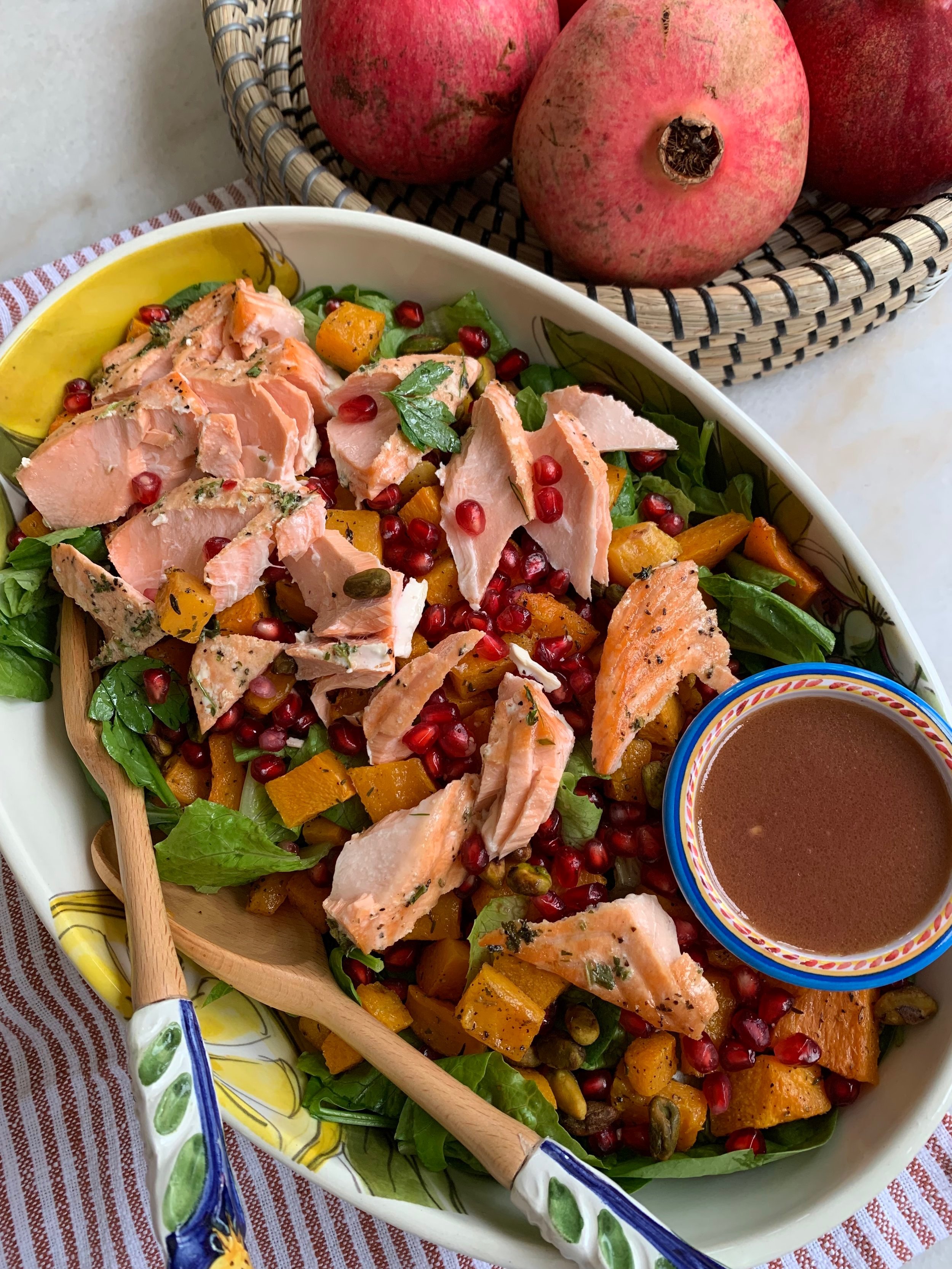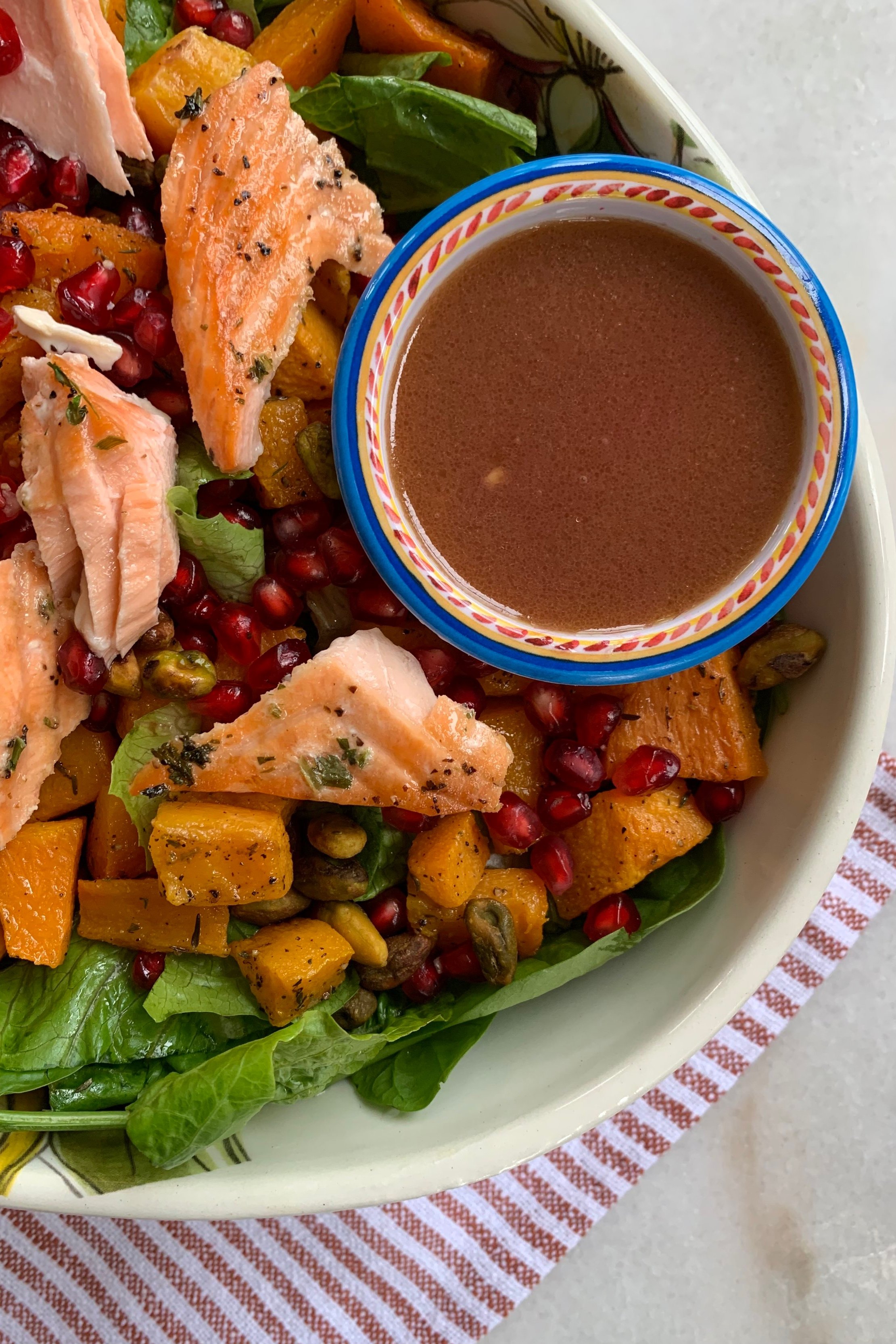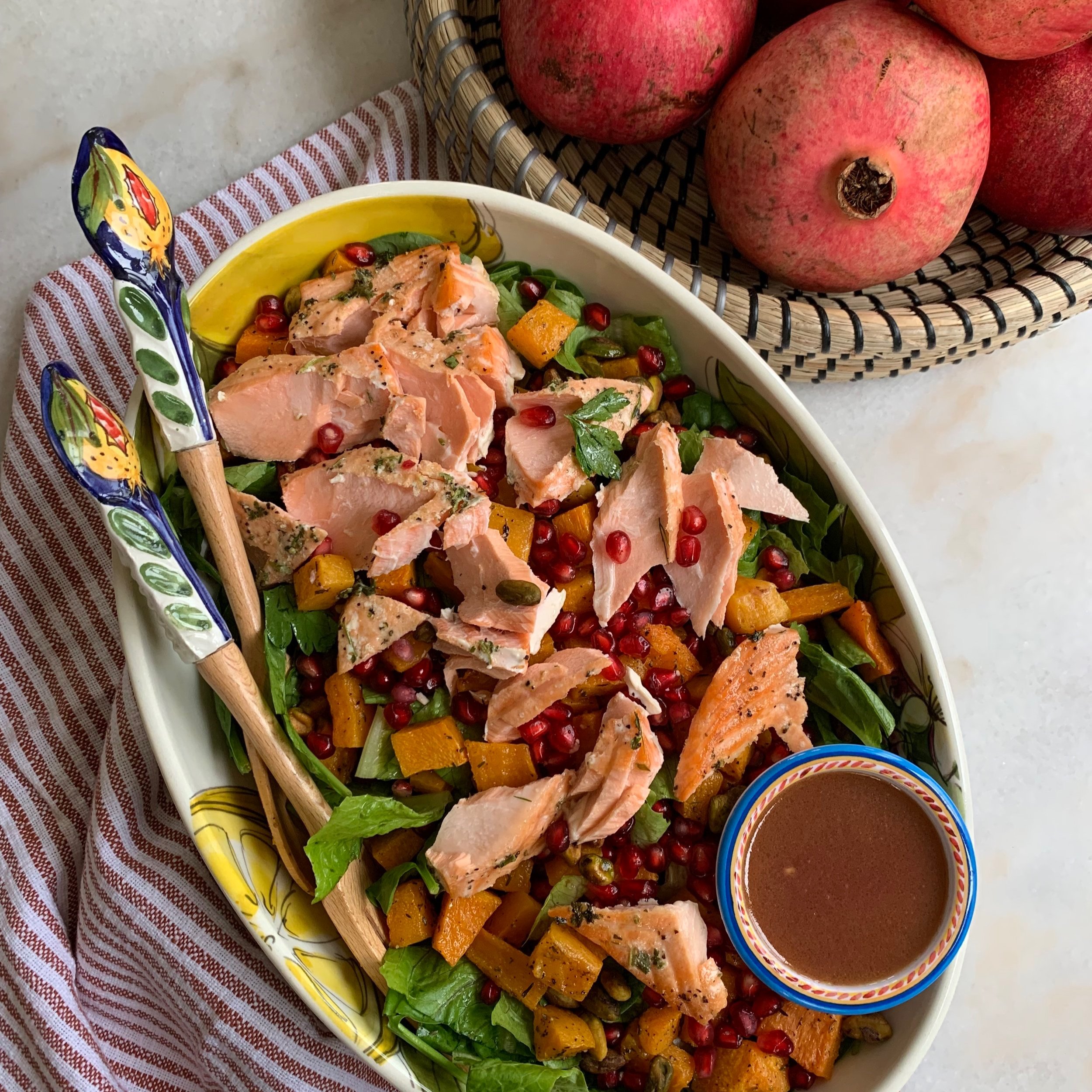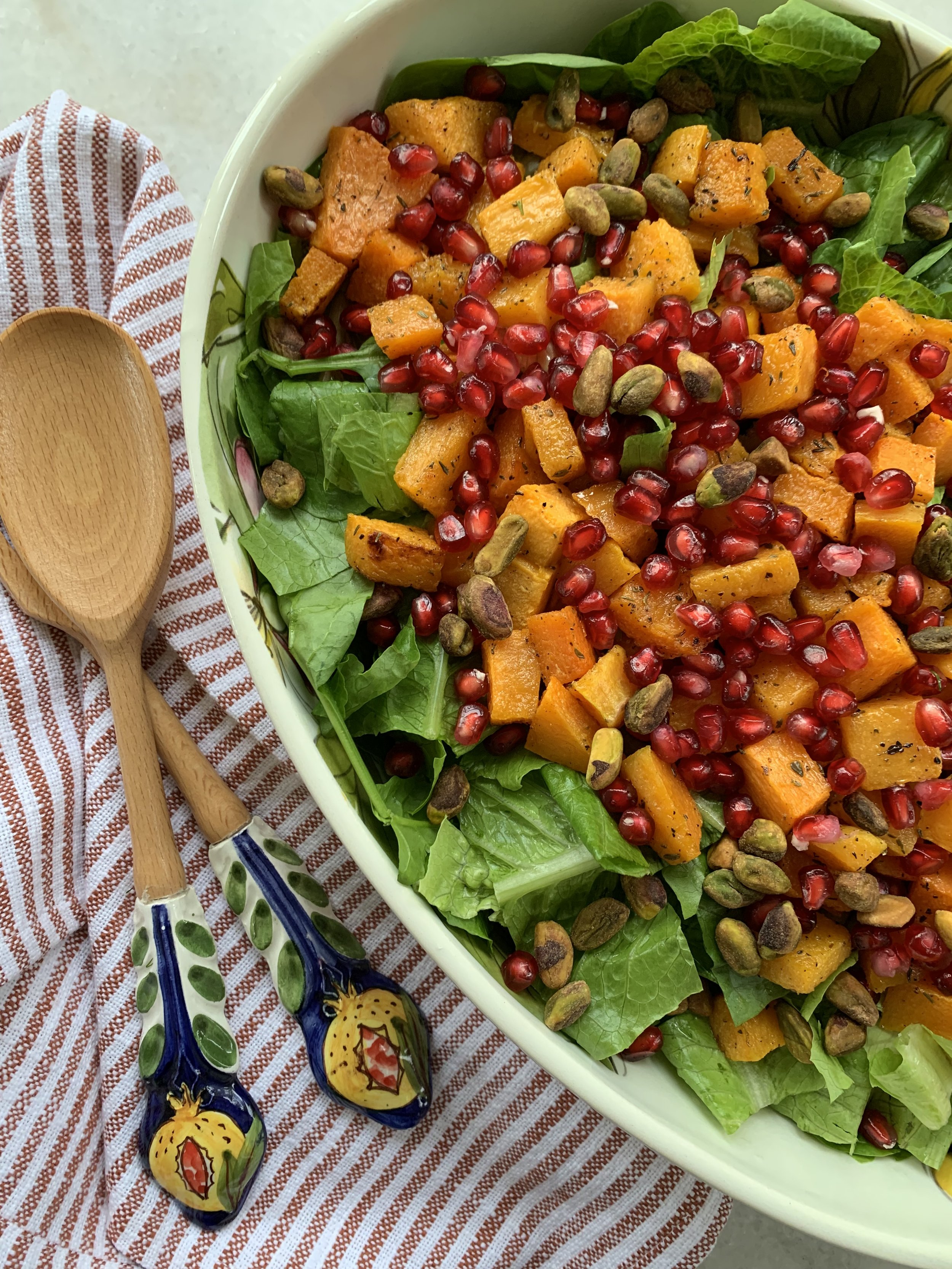Star of the Show: Harvest Salad with Sweet-Savory Pomegranate Dressing
Want to impress your guests or host without spending all day in the kitchen? Then this salad is for you! Between the gorgeous colors, the mix of textures and flavors, this salad will take center stage on your table this holiday season.
Layered with gorgeous leafy greens like crunchy romaine and delicate spinach and topped with roasted winter squash, pomegranate arils, and pistachios, it’s a sure (and relatively easy) crowd-pleaser. The sweet-savory pomegranate dressing is not to be missed. Not only are you getting antioxidants from the arils but also from the pomegranate juice in the dressing. Talk about a double hitter!
Winter squash - Bright orange winter squash, including butternut, acorn, pumpkin and my fav delicata squash, are super high in phytonutrient antioxidants called carotenoids. Dark leafy greens are also high in carotenoids, but they aren’t orange because chlorophyll, aka green plant pigment, dominates carotenoids color-wise, but they’re still there! Carotenoids are an important phytonutrient for eye and skin health. Our bodies convert them to vitamin A, where they get to work reducing inflammation in the skin and encouraging skin turn-over for a fresher, brighter complexion. This is great for people who struggle with skin conditions like acne, eczema, and psoriasis. Also, in some rando study I found, people who ate more carotenoids were perceived as more attractive to others because they had a warmer glow to their skin. Carotenoids are also really important for eyesight, specifically night vision, and protect our skin against UV, radiation, and inflammation. In fact, eating carotenoid-rich foods protects our eyes from the damaging effects of blue light from screen-time. In our Zoom-driven, laptop-dependent, smartphone-as-an-appendage lives, we are constantly bombarded by blue light, which triggers free radical formation and inflammation in the macula and retina - the part of the eye responsible for visual acuity. Guess what blocks blue? ORANGE!
Spinach - This dark leafy green is also high in carotenoids plus, spinach is a great source of calcium, iron, magnesium, potassium, and folate. You can increase your body’s ability to absorb the iron in spinach by eating it with foods that are high in vitamin C. That might make you think citrus, but in this recipe, the pomegranate arils have us covered! Spinach is an anti-inflammatory food with specific kinds of antioxidant phytonutrients that help your body balance free radicals and inflammation in your body. When you balance inflammation with food, you reduce your risk for chronic illnesses like heart disease and cancer. The potassium in spinach make it supportive of bone health and healthy blood pressure.
Romaine lettuce - In this recipe, we’re combining baby spinach with romaine lettuce for it’s mild flavor and crunchy texture. If you or your guests/family don’t love baby spinach, you can definitely use all romaine lettuce and it’ll still come out great. You might not think romaine lettuce provides much nutritionally, but you’d be wrong! It’s got minerals including calcium, phosphorus, magnesium and potassium, as well as vitamin C, K and folate. It’s a decent source of beta-carotene, but not as much as spinach and butternut squash. These nutrients support healthy blood pressure and bone health. Some people say that romaine lettuce is mostly water, and that’s true - it’s about 95% water - but it’s not a reason to write off romaine. High water foods offer our bodies “structured water,” which is deeply hydrating.
Thyme - One of my favorite winter herbs, thyme has a long list of potential health benefits, including supporting the immune system. Thyme has anti-microbial, anti-fungal and antioxidant properties and it’s been used for centuries for respiratory conditions like coughs and congestion. A phytonutrient called thymol is likely to thank for many of these benefits. One of my favorite home remedies for cough and chest congestion is to steep a whole bunch of dried thyme in hot water and drink it as a tea.
Pomegranate arils - The star of the show here are the gorgeous pomegranate arils that top this salad. If you can’t already tell from my blog, I’m a pomegranate junkie. Once late fall rolls around, my house is always stocked with fresh pomegranates. Why? They’re packed with flavor and phytonutrients that help balance inflammation in the body and prevent free radicals from damaging your cells and DNA. Plus, your gut microbes LOVE pomegranates. The little pits inside the arils (seeds) are totally edible and are fuel for your beneficial microbes to flourish. And pomegranates specifically encourage the growth of a specific kind of friendly microbe called Akkermansia, which is responsible for regulating healthy gut mucuosa. If your gut mucosa isn’t healthy, you can over or under produce mucus in the digestive tract. Too much blocks nutrients from getting absorbed and too little allows for damage to your intestinal lining. It’s the Goldy Locks of the gut! But back to pomegranates - the sweet, tart pop of flavor is my absolute favorite and I hope you love it too! And no, we don’t worry about the sugar in pomegranates the majority of the time (even when we’re fighting yeast, mold and parasites) because the benefits to this food generally win out!
Pistachios - Ah pistachios, my favorite nut. Pistachios are a fabulous source of fiber, minerals and healthy fats that really satisfy. The fiber and protein help you feel full and satisfied, and their nutrient profile is also impressive. It’s a great source of vitamin B6, which is important to healthy blood flow, carrying oxygen to tissues and cells, and supports healthy immune and nervous systems. Pistachios’ phytonutrients are unique in that they’re not really found in other nuts, specifically carotenoids lutein and zeaxanthin - again, great for eyes and skin health! Plus, pistachios are a great source of vitamin E and polyphenols, major antioxidants in the body. If you’re not a fan of pistachios (whaaaat?), you can also use pecans and it’ll taste just as great. If anyone’s allergic to nuts, use raw shelled pumpkin seeds.
To turn this salad into a blood sugar balancing, anti-inflammatory meal, just serve with roasted or grilled salmon or chicken!
Fall Harvest Salad
Yield: 6 servings
Ingredients
1 large butternut squash, peeled and cubed
2 Tbsp avocado or olive oil for roasting
½ tsp sea salt
¼ tsp ground black pepper
1 tsp dried thyme
5-6 oz baby spinach
2 romaine lettuce hearts, chopped
1 cup POM Wonderful pomegranate arils
4 tbsp unsalted pistachios
Tip: Serve with roasted salmon or grilled chicken breast
Instructions
1. Preheat the oven to 400 degrees. In a medium-sized bowl, add cubed butternut squash with avocado oil, salt, pepper, thyme and combine well. Spread the squash on a parchment paper-lined baking sheet and roast in the oven until golden brown and fork-tender, about 30-35 mins, turning the squash once after about 20 mins. Remove from heat and allow to cool for at least 15 mins.
2. While the squash is roasting, add baby spinach and romaine lettuce to a large salad bowl.
3. Layer roasted squash onto salad greens.
4. Dress with Sweet-Savory Pomagranet Dressing and toss just before serving, then top with pomegranate arils and pistachios.
Sweet-Savory Pomegranate Dressing
Ingredients
4 Tbsp POM Wonderful pomegranate juice
2 Tbsp white wine vinegar
1 Tbsp Dijon mustard
2 tsp shallot, minced
½ tsp sea salt
⅓ cup extra virgin olive oil
Instructions
In a small bowl, whisk the pomegranate juice, vinegar, Dijon mustard, and sea salt together until well blended. Add minced shallot. Whisk in the olive oil until it forms an emulsion. You can also add all the ingredients into a mason jar or resealable jar and shake until an emulsion is formed. Adjust salt to taste and enjoy! Stores well in the refrigerator for about a week.





